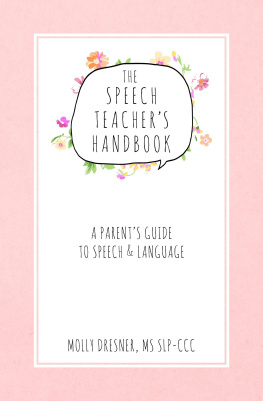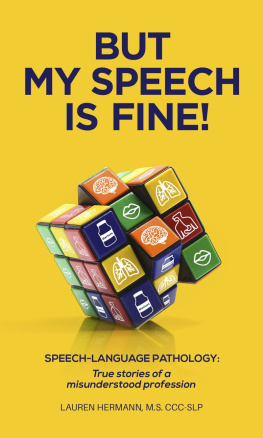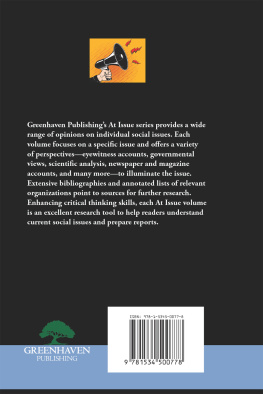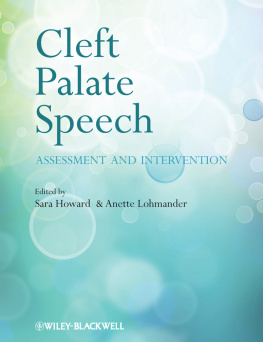Molly Dresner - The Speech Teachers Handbook: A Parents Guide to Speech & Language
Here you can read online Molly Dresner - The Speech Teachers Handbook: A Parents Guide to Speech & Language full text of the book (entire story) in english for free. Download pdf and epub, get meaning, cover and reviews about this ebook. year: 2017, publisher: CreateSpace Independent Publishing Platform, genre: Children. Description of the work, (preface) as well as reviews are available. Best literature library LitArk.com created for fans of good reading and offers a wide selection of genres:
Romance novel
Science fiction
Adventure
Detective
Science
History
Home and family
Prose
Art
Politics
Computer
Non-fiction
Religion
Business
Children
Humor
Choose a favorite category and find really read worthwhile books. Enjoy immersion in the world of imagination, feel the emotions of the characters or learn something new for yourself, make an fascinating discovery.
- Book:The Speech Teachers Handbook: A Parents Guide to Speech & Language
- Author:
- Publisher:CreateSpace Independent Publishing Platform
- Genre:
- Year:2017
- Rating:3 / 5
- Favourites:Add to favourites
- Your mark:
- 60
- 1
- 2
- 3
- 4
- 5
The Speech Teachers Handbook: A Parents Guide to Speech & Language: summary, description and annotation
We offer to read an annotation, description, summary or preface (depends on what the author of the book "The Speech Teachers Handbook: A Parents Guide to Speech & Language" wrote himself). If you haven't found the necessary information about the book — write in the comments, we will try to find it.
Molly Dresner: author's other books
Who wrote The Speech Teachers Handbook: A Parents Guide to Speech & Language? Find out the surname, the name of the author of the book and a list of all author's works by series.
The Speech Teachers Handbook: A Parents Guide to Speech & Language — read online for free the complete book (whole text) full work
Below is the text of the book, divided by pages. System saving the place of the last page read, allows you to conveniently read the book "The Speech Teachers Handbook: A Parents Guide to Speech & Language" online for free, without having to search again every time where you left off. Put a bookmark, and you can go to the page where you finished reading at any time.
Font size:
Interval:
Bookmark:

Copyright 2017 by Molly Rai Dresner, MS SLP-CCC
All rights reserved. This book or any portion thereof may not be reproduced or used in any manner whatsoever without the express written permission of the publisher except for the use of brief quotations in a book review.
Printed in the United States of America
ISBN-13: 978-1976318047
ISBN-10: 1976318041
Cover design by Justin Pike
Book design and layout by Kent Bingham
To Alex,
whatever is done by only me is your doing, my darling
E.E. Cummings
Acknowledgments
A very special shout out goes to all of the families that I have had the privilege to work with. Thank you for welcoming me onto your team. I love every minute of working with you and your children. You hold a very special place in my heart.
A gigantic thank you to my family and friends who are family. I appreciate your endless support, advice, and love. I am forever grateful for your responsiveness to every phone call, text, and email throughout the day.
To all of my professors, supervisors, colleagues and SLP loves, thank you for sharing your wisdom and strength. You inspire me on a daily basis and I have learned so very much from each of you. Phyllis, you are my role model and I am eternally thankful for all that you have taught me.
Thank you to Bernadette Murphy for editing this handbook and providing creative insight. Thank you to Kent Bingham who made this labor of love come to life. Thank you to Justin Pike for your beautiful designsyour talent is magic.
Thank you to the brilliant folks at Clyde Group. You have provided me with an incredible amount of guidance and encouragement throughout this process. I am so appreciative that you have held my hand each step of the way.
Table of Contents
Introduction
H ello! The fact that you picked up this handbook tells me you probably live with a little one who is having a hard time communicating. If so, you have come to the right place! This handbook is designed so that you can read it in one or two sittings and then immediately begin to help your child improve his or her communication skills. The book will give you fun and functional suggestions for improvement and a host of activities to choose from that are easy and natural to incorporate into your daily routine.
As a speech language pathologist, I am often asked by parents and caregivers, What can I do to help my child? This easy-to-read, easy-to-follow guide is my answer to that question. You are with your child the most and see her in a variety of different contexts. You know what hes like at home, how she plays at the park, what he says (or doesnt say) at the doctors office, at daycare or school, and in the car/train/ bus. Together, we will work to help her communicate better, no matter where you are.
The idea for the booklet came about when I realized that we each hold a unique piece of the puzzle. You know your child best and how most easily to work with her. With years of experience working with little ones, I bring proven techniques for improving his speech and language skills. Working together, we can make great strides in helping your child communicate effectively and easily.
This handbook is meant to serve as a reference as well as a resource for tried-and-true speech therapy tips. Please note, however, that this handbook is not meant to be a substitute for traditional speech therapy or a quick fix. If you believe your child needs a speech language pathologist, please consult with your childs pediatrician or teacher.
My Story
I am a speech language pathologist who found my niche working with children under the age of five. It is truly a privilege to teach children how to communicate and I take my role of advocate very seriously. By advocate I mean that when I am clinically engaged with helping a child, I am that childs voice until he is able to communicate independently. When I work with families, I insert myself into their daily routine. I come to the house and sit on the floor. I join in any activity that she is playing and provide parents with tips and tricks on how to make that activity more speechy. I listen, observe, and provide insight in order to become a true member of the team.
As much as I wish I could be in every living room, on every floor, working with every childI simple cant. I created this handbook in hopes that my words can reach as many families as possible.
In case you are interested
in the nitty-gritty
I am a nationally certified speech language pathologist. I hold a Certificate of Clinical Competence (CCC) from the American Speech and Hearing Association (ASHA). Additionally, I am a certified Teacher of Students with Speech and Language Disabilities (TSSLD). I completed my masters degree in Speech & Language Pathology at Teachers College, Columbia University and my bachelors degree in Speech and Hearing Science at The George Washington University.
The bottom line:
My career has been dedicated to pediatric speech and language. I have worked in a variety of environments including home and community-based settings, daycares, preschools, and hospitals. I am passionate about involving family members in the therapeutic process and I recognize the value of empowering the individuals who care for the child on a daily basis.
Each and every day, my goal is to help you help your little one communicate.
Lets get started.
Principle #1:
Baby Steps Are The Biggest Steps
I t is a biological urge to want your child to be the smartest, brightest, happiest kid in the room. You are her biggest fan, and you should be. It is important for you to be his first cheerleader, so that he gains confidence in his own actions down the line. Additionally, it is important to realize that baby steps are appropriately named. Your baby, from birth up until five years old, is literally changing and growing in the most incremental ways each day.
Therapists are hypersensitive to every single, almost undetectable thing that your child is doing. We are always on and keeping track of the differences that are occurring in your childs ability to understand others and express her wants and needs. And you should not be ! Please do not expect that of yourself.
But its very important to find satisfaction in small changes. Every one of them is incredibly important to the learning process. So take each step as it comes and please, do not skip steps. That makes it harder for your child and will only cause frustration.
One of lifes mysteries is how the majority of children learn language so quickly and seamlessly. Especially a language like English, which is full of exceptions to the rule. As much as every single child is different and unique, more often than not, they are all trekking through the various stages of language learning together. That is, your baby is going to start to make sounds based on happiness (coo sounds, gurgle sounds, giggles,) and not-so-happiness (cries and whines) before he babbles. Children are going to babble sounds before they start to produce what we call jargon. Jargon is when your child says a string of syllables that sound like gibberish with appropriate inflection, as if shes speaking in her own little language. He is going to produce jargon as he begins to say those first few words. And she will produce roughly 25-50 single-word productions (mama, dada, baba, ball, up, more, juice, etc.) before she starts to combine those words (more juice mama up etc.)
We Have to Know What Words
Mean Before We Can Use Them
In working with children who struggle with communication, its often that receptive languageour childs understanding of languageis overlooked. Its important to remember that these receptive skills come first! Your child needs to be able to understand what is being said, before he will be able to use language to communicate.
Next pageFont size:
Interval:
Bookmark:
Similar books «The Speech Teachers Handbook: A Parents Guide to Speech & Language»
Look at similar books to The Speech Teachers Handbook: A Parents Guide to Speech & Language. We have selected literature similar in name and meaning in the hope of providing readers with more options to find new, interesting, not yet read works.
Discussion, reviews of the book The Speech Teachers Handbook: A Parents Guide to Speech & Language and just readers' own opinions. Leave your comments, write what you think about the work, its meaning or the main characters. Specify what exactly you liked and what you didn't like, and why you think so.









